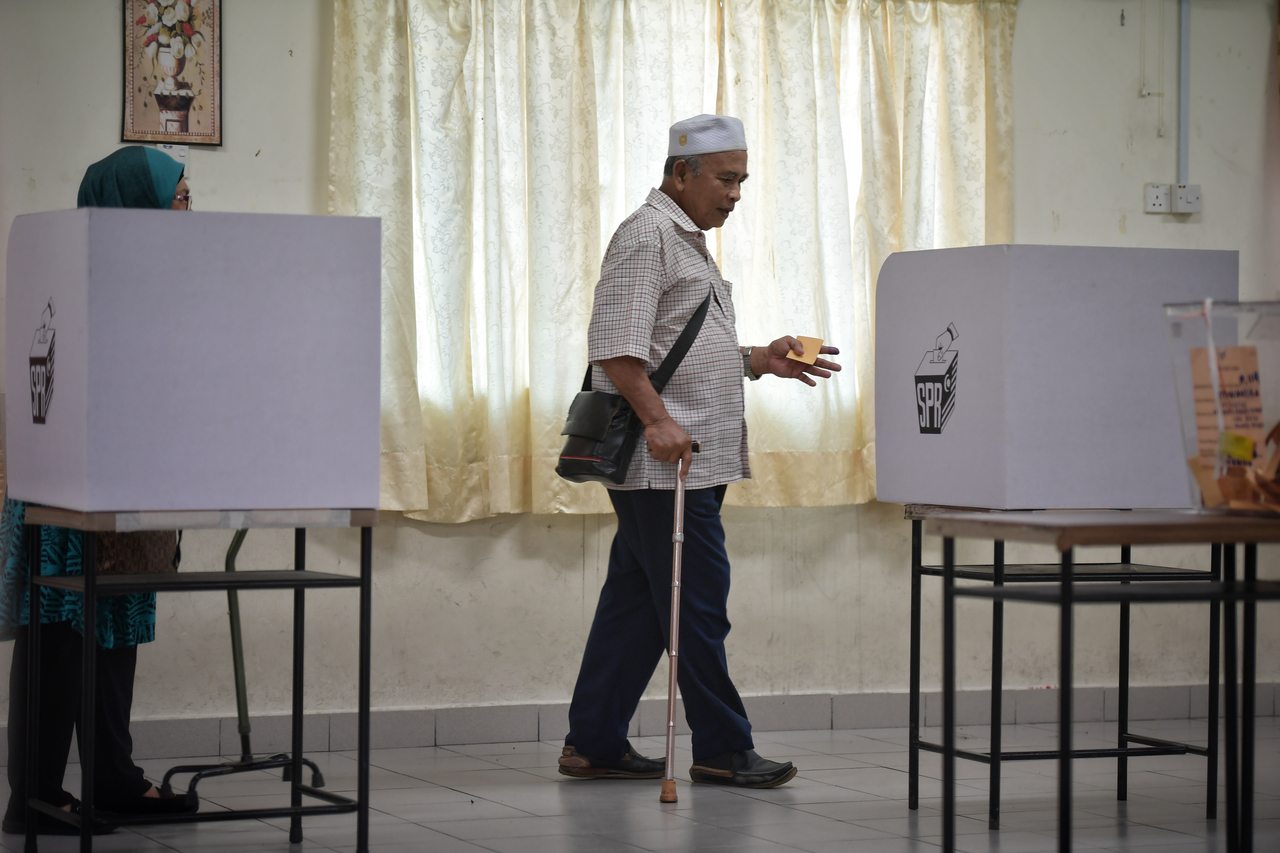Sabah to face snap polls within 60 days after state assembly is dissolved
Sign up now: Get insights on the biggest stories in Malaysia

In a photo taken on May 9, 2018, voters prepare to cast their ballots in Kampung Bahru, Kuala Lumpur.
PHOTO: ST FILE
KUALA LUMPUR - Malaysia's Sabah state will face a snap election after its state assembly was dissolved on Thursday (July 30), following attempts by a former chief minister to form a new government after securing several defections.
Chief Minister Shafie Apdal announced the state assembly's dissolution at a press conference in Kota Kinabalu, saying the state's Governor Juhar Mahiruddin has consented to the dissolution.
"I met TYT (the governor) last night (Wednesday) to express our intention, and then we made preparations, so this morning I went to Istana around eight-something, and he approved this.
"I think it's time for us to return the mandate to Sabahans," Datuk Seri Shafie told reporters.
Former Sabah chief minister Tan Sri Musa Aman on Wednesday met the press with 32 state lawmakers, including himself, and indicated he was ready to form a new government to replace the one led by Mr Shafie's Parti Warisan Sabah.
Warisan is backed by the Pakatan Harapan (PH) opposition bloc, with Mr Shafie himself a staunch ally of former premier Mahathir Mohamad.
The election has to take place within 60 days of the dissolution. Mr Shafie will remain as the caretaker chief of the East Malaysian state until the polls take place. Only state assemblymen will be elected during the state election, with the 25 Sabah federal MPs retaining their wards.
The Sabah legislature has 60 elected lawmakers and five who are appointed by the reigning state government.
Until Mr Musa's news conference on Wednesday, Mr Shafie's coalition controlled 45 of the 65 seats, or more than two-thirds.
A minimum of 33 seats are needed to form the state government.
The state polls will represent the first major political battle between the five-month old Perikatan Nasional (PN) government and PH-led opposition bloc.
The election in Sabah, Malaysia's second biggest state by land area after Sarawak, goes beyond the fight between two arch rivals - Mr Shafie, 63, and Mr Musa, 69.
A victory for PN could help Prime Minister Muhyiddin Yassin entice several Sabah MPs to his alliance, thus securing a more comfortable majority in Parliament, where he holds only a two-seat majority.
The election will also be a litmus test for the federal opposition bloc, which remains split over its choice of a prime ministerial candidate.
The three-party PH is led by Datuk Seri Anwar Ibrahim. The rest of the opposition MPs are lumped together under the so-called PH Plus alliance, consisting of MPs from Tun Dr Mahathir's group and those from Warisan led by Mr Shafie.
The cooperation and performance of the blocs led by Mr Anwar and Dr Mahathir in Sabah will be a crucial precursor for their working relationship at the federal level, with national snap polls expected within the next few months.
The PN aliance led by Tan Sri Muhyiddin is now in control of nine out of the 13 Malaysian states, after successfully toppling PH-led state legislatures in Perak, Johor, Melaka and Kedah.
Sabah is the first state to opt for a dissolution of the assembly, rather than allow itself to fall to PN by way of defections.
With Sabah's dissolution, PH and its partners are now left with just three state administrations in Selangor, Penang and Negeri Sembilan.
Sabah is home to 3.4 million people, just over 10 per cent of Malaysia's population. Its economic output is the fifth-largest among Malaysia's 13 states, although it is one of the country's poorest state by gross domestic product (GDP) per capita.
The Borneo states of Sabah and Sarawak are historically known to be allies of the federal government, but the result of the 2018 election, where Umno-led Barisan Nasional (BN) lost federal power for the first time, caused significant change in the region.
The Sarawak ruling coalition exited BN and formed Gabungan Parti Sarawak (GPS), an independent bloc in Parliament, but since March have backed PM Muhyiddin's PN government.
Mr Shafie's Warisan had continued to back PH and its partners despite the collapse of the federal government in late-February.
In the 2018 state assembly elections, Mr Shafie's Warisan, along with PH parties, won 29 out of the 60 seats contested in the state assembly. BN, led by Mr Musa, also won 29 seats, leading to a hung assembly.
But Mr Shafie managed to secure crossovers from several BN parties to form the state government.


